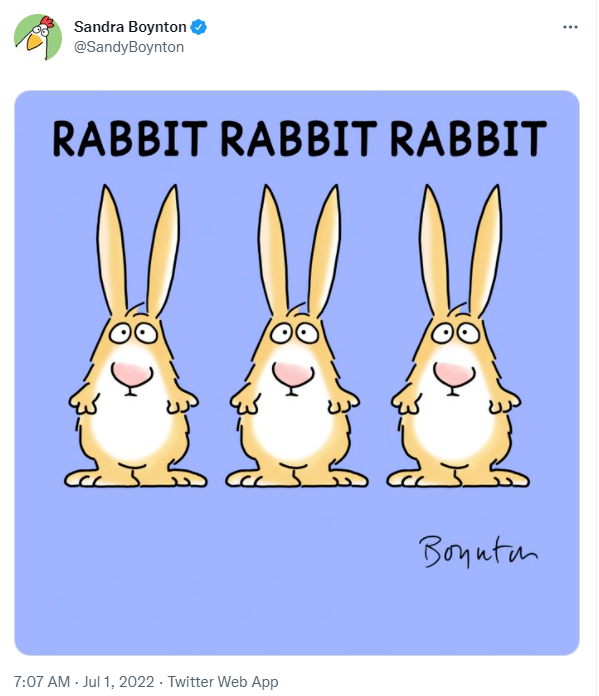The Wild Goose/Rabbit Rabbit Chase
Hi!
Today is July 1st, which — obviously — is the first day of the new month. It’s also an opportunity for me to share a fact that I tried to find out more about but failed. I don’t blame myself; I blame the lack of written-down information a century ago. But thanks to Wikipedia, at least I’m pretty confident that the origin is truly lost to time.
Before I get there, though, a brief programming note: there won’t be a Now I Know hitting your inbox on Monday, as it’s the 4th of July, and email open rates are really low. So, this is it until Tuesday.
Anyway, onto the rabbit goose chase.
There’s a small but significant tradition in the United States and, apparently, the UK and maybe Canada and other parts of the English-speaking world; people greet each other on the first day of a new month by saying “rabbit, rabbit.” Don’t take my word for it. If you search Twitter for the phrase, you’ll see plenty of proof, including the tweet below by children’s book author Sandra Boynton (whose book “Pajama Time!” was a Lewis household fave a decade ago, and I still probably know 50% of it by heart).

The greeting is supposed to bring the speaker and listener alike some good luck over the upcoming month. That’s BS but, being the borderline obsessively curious person I am, I spent a bit of time trying to figure out where such a weird tradition and myth came from. And the short answer is “maybe some kids back in the early 1900s, but no one really knows.” Here’s what the relevant section of the Wikipedia entry for “rabbit, rabbit, rabbit” says, and you’ll see that it’s not all that satisfying.
The exact origin of the superstition is unknown, though it was recorded in Notes and Queries [a scholarly journal at the time] as being said by children in 1909: “My two daughters are in the habit of saying ‘Rabbits!’ on the first day of each month. The word must be spoken aloud, and be the first word said in the month. It brings luck for that month. Other children, I find, use the same formula.”
In response to this note another contributor said that his daughter believed that the outcome would be a present, and that the word must be spoken up the chimney to be most effective; another pointed out that the word rabbit was often used in expletives, and suggested that the superstition may be a survival of the ancient belief in swearing as a means of avoiding evil. People continue to express curiosity about the origins of this superstition and draw upon it for inspiration in making calendars suggestive of the Labors of the Months, thus linking the rabbit rabbit superstition to seasonal fertility.
Now, if you’re objecting to me using Wikipeda as a source here, you’re right — I shouldn’t be. Wikipedia isn’t a primary source (no encyclopedia is), it’s world-editable, etc. etc. — there are lots of reasons why Wikipedia is not a reliable source, as Wikipedia itself notes. But I think that underscores my general point. If you’re in my position — a hobbyist who writes a newsletter but isn’t a professional academic researcher by any stretch — access to primary sources before the late 1800s is rather limited. Few pre-1900 newspapers have been digitized in a searchable way (at least online) and there were not a lot of other written-down sources than newspapers. So I am kind of stuck with what I have available. The “good” news is that while I’m hardly unique in this regard; the nature of Wikipedia is that someone who does have access to an otherwise not-online source can add that information to Wikipedia.
So when it comes to the origins of things like “rabbit, rabbit,” when Wikipedia says that “the exact origins is unknown,” that’s good enough for me. I’m not going to dig further. Over time, someone may find a source that explains the history better, sure, but it’s not likely going to be me.
But just in case it works: rabbit rabbit!
The Now I Know Week in Review
Monday: The Silver Miners That Left Behind Blue Gold: If you see some old (I mean, VERY old) blue jeans lying around an old mine, pick them up!
Tuesday: The Banned Fashion Accessory You Wore on Your Head: The fact that these were banned is probably a bad thing, given the context of why they were used.
Wednesday: Frosted Flakes? Or a Bright Idea?: The title I used doesn’t make a lot of sense — I meant “flake” as in “an unreliable person,” but that’s a stretch.
Thursday: Dennis the Coincidence: The story of Dennis the Menace and the other guy named Dennis the Menace.
And some other things you should check out:
Some long reads for the weekend.
1) “Safety Town” (Guernica Magazine, 12 minutes, June 2022). I love this idea. LOVE it. These “traffic gardens” should be part of the elementary school curriculum, built into gym classes. It’d save lives.
2) “When Baking and Real Estate Collide” (New Yorker, 15 minutes, June 2022). A pull-quote: “Tech was booming. Rents were skyrocketing. Tartine [the bakery] had thrived during an economic downturn. Now it was operating in one of the most expensive cities in the world. In Silicon Valley, startups were following a new business rule: grow or die. But how much was it possible for an artisanal bakery to grow?”
3) “How OXO Conquered the American Kitchen” (Slate, 13 minutes, June 2022). Apparently, there’s a niche community out there who swears by a certain brand of kitchen gadgets. I am not one of them, but I appreciate stories like this. I think you will, too.
See you Tuesday, and have a great weekend!
Dan
